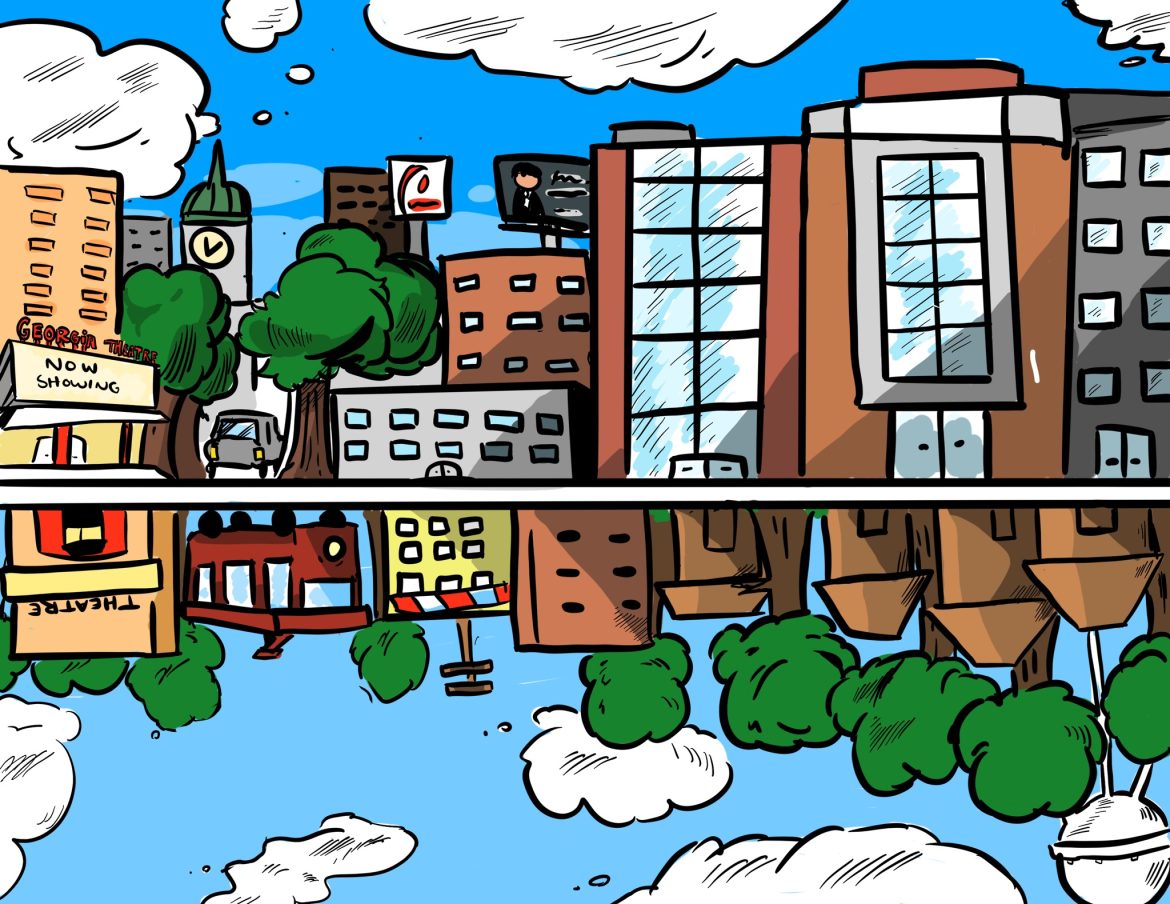How Athens appeared in the past (top) is compared to how Athens is currently presented (bottom). Athens has a rich history, from the Hot Corner Business District to Linnentown to local businesses, but some of this history has been erased from documentation. “Athens citizens should challenge themselves to learn about the history of the community around them and acknowledge the changes that have occurred,” Managing Editor Maya Clement wrote. Illustration by Sam Harwell
Managing Editor Maya Clement voices her concern that Athens citizens must recognize the city’s history before it is completely gone.
There is a layered history throughout the communities where people live, but this history is not always well-known.
In Athens, monuments, cultural landmarks and historical areas have been erased. As a result, the city has drastically shifted and citizens have been displaced, leaving the city vastly different now than it used to be.
Yet, not all of this change is common knowledge that one can find in the historical record. Some of Athens’ past, especially focusing on Black history, has been erased from history, leaving these crucial memories to be passed down from generation to generation by word of mouth.
For example, from 1962-66, dozens of Black families were displaced from their homes in a local neighborhood community called Linnentown due to an Urban Renewal Program. However, until recently Linnentown wasn’t mentioned anywhere in documented Athens history, leaving only living residents to share their experience.
In a town with a 24.6% Black population, the second greatest racial group in Athens according to the Athens-Clarke County website, the unacknowledged Black history of Athens is information that needs to be told. It is an injustice to take away such a large part of the city and population’s past.
Beyond communities, there have been changes in businesses throughout Athens. In June of 2021, local restaurant The Varsity, previously located at 1000 W. Broad St., closed after nearly 60 years of service starting at that location in 1964.
As a lifelong Athens resident, Clarke Central High School Principal Dr. Swade Huff has seen the effect of historical changes on the city.
“The word that comes to mind is surprised because you have certain communities that I’ve known since I was born that are no longer here. You have The Varsity, quarter of a mile away (from CCHS), maybe a half mile away behind Sheats Barber Shop, where I grew up because of my grandma. She still resides there and her neighbors are white,” Huff said. “For me to see the transformation, and I look back and compare when I was a kid to now, the diversity that I’m seeing in the city is different.”
If Athenians don’t recognize history, especially what is not written in history books, it will fade away until it is completely gone. Athens citizens should challenge themselves to learn about the history of the community around them and acknowledge the changes that have occurred.
If Athenians don’t recognize history, especially what is not written in history books, it will fade away until it is completely gone. Athens citizens should challenge themselves to learn about the history of the community around them and acknowledge the changes that have occurred.
This local history is represented in a variety of ways throughout the city such as through murals, fashion, local restaurants, businesses and music.
One example in Downtown Athens is Hot Corner, an African-American business district that has existed since the early 1900s. There Athenians can find places like the historic Morton Theatre and Wilson’s His and Hers Styling Shop which have been open for 113 years and 71 years, respectively.
To learn more about Athens history, there are several things that Clarke Central High School students can do. One solution is to talk with older generations, either within families or at community events such as the 60th Anniversary of Integration Event on Sept. 17, sponsored by the Athens branch of the Association for the Study of African American Life and History, about the history they experienced.
These events keep the unwritten past of Athens alive. Another option is attending community member visits hosted in the CCHS Media Center. Prominent figures who have visited are Athens artist Broderick Flanigan and Linnentown first descendants such as Hattie Thomas Whitehead.
Lastly, in 2024, a Black History Center will be built to share more unknown parts of Athens history, a project overseen by Thomas Whitehead, which more directly seeks to educate the community on Athens’ Black history.
Overall, locals and students should push themselves out of their comfort zones and interact with people who want to share their stories. They need to try to gain an understanding of the deep history that Athens holds and pass it along, so that it will never be forgotten.
